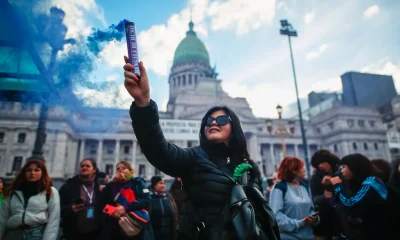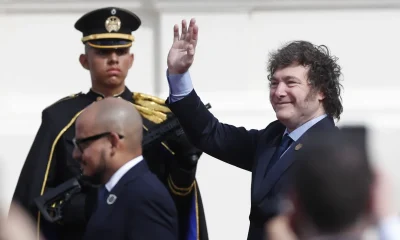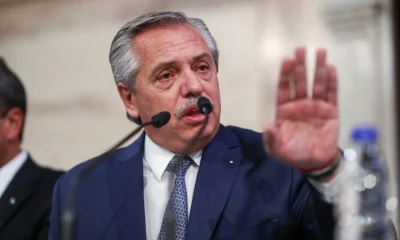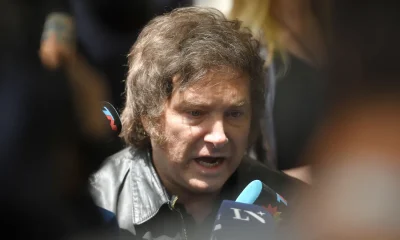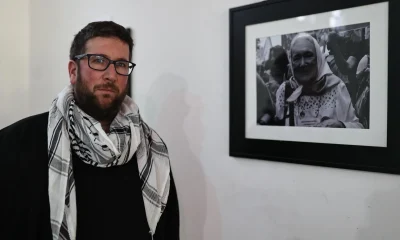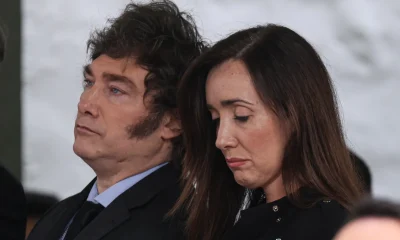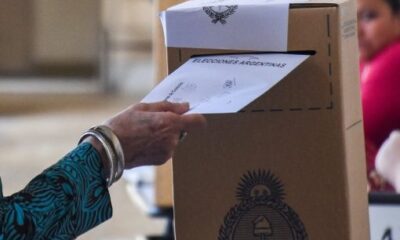International
Milei, willing to convince other countries to adopt sanctions against Venezuela
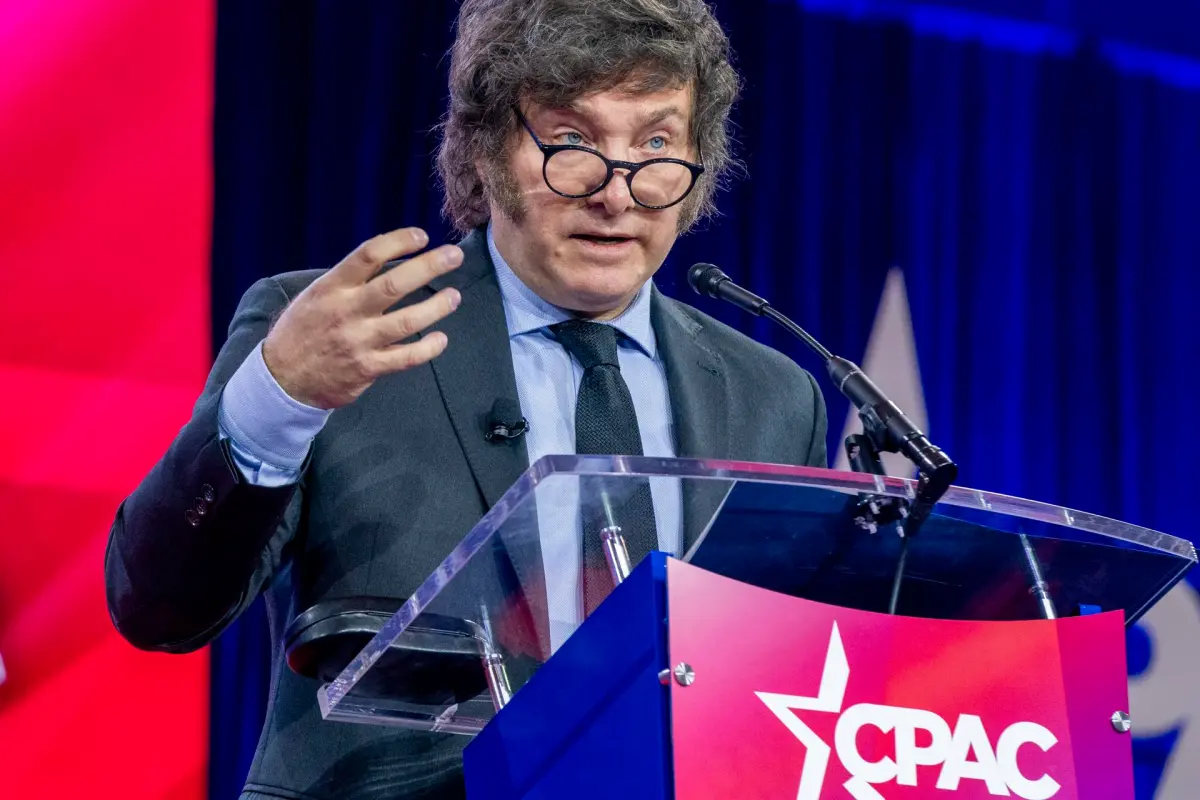
“I would have no problem” in adopting diplomatic sanctions against Venezuela, the president of Argentina, Javier Milei, said in an interview with CNN, who would even be willing to convince other countries to support that same measure.
“Yes, I would be willing to do it, because the carnage that is Venezuela is truly unheard of; the same as the prison island of Cuba,” said the Argentine head of state during an interview with journalist Andrés Oppenheimer, whose first part was broadcast in full this Sunday.
“Then there are other cases that are on the way, such as the case of Colombia, with Mr. (Gustavo) Petro. Well, you can’t expect much from someone who was a terrorist killer, a communist,” Milei added in a part of that interview that was already anticipated last Wednesday.
As a result of those statements, the Ministry of Foreign Affairs of Colombia issued a statement reporting that the expulsion of diplomats from the Embassy of Argentina in that country was ordered.
“The expressions of the Argentine president have deteriorated the confidence of our nation, in addition to offending the dignity of President Petro, who was democratically elected,” said the Colombian Foreign Ministry, which communicated its decision to the Argentine diplomatic representation through “institutional channels.”
Last Monday, the governments of Argentina, Costa Rica, Ecuador, Guatemala, Paraguay, Peru and Uruguay issued a joint statement in which they expressed their “serious concern” about the allegations of the Venezuelan opposition about the obstacles to registering their candidate.
Buenos Aires’ support for that statement represents “a step forward,” according to Milei, because “the previous Government (presided over by the Peronist Alberto Fernández) would not have condemned any of those dictatorships,” he said.
Asked about the critical opinions of him of the president of Mexico, Andrés Manuel López Obrador, and the ruling and favorite candidate in the polls, Claudia Sheinbaum, the Argentine president responded: “It is a compliment that an ignorant like López Obrador speaks ill of me, exalts me.”
And he added: “It is a problem of Mexicans if they choose socialists (…), I feel sorry for the one who has to suffer a socialist regime.”
Regarding an eventual trip of Pope Francis to Argentina, Javier Milei considered that “we should not be pressuring him,” and pointed out that it is a decision that is up to the Supreme Pontiff.
“I offered to accompany him and be by his side, I would almost tell him like a human cane (…), but he is the one who must make that decision to face so much physical burden,” he added.
After asserting that “the left in its different versions is the cancer of humanity,” Milei considered that, in fact, the Colombian president, Gustavo Petro, and the Brazilian, Luiz Inácio Lula da Silva, were democratically elected, but added that “every day they advance more on individuals towards more collectivist solutions.”
The Argentine ruler maintained that the desire he conveyed to former United States president Donald Trump (2017 -2021) to return to the White House “in protocol terms does not count,” because it took place in a casual meeting during the Conservative Political Action Conference (CPAC), held a month ago in Maryland (USA).
“I am more affioy to the ideas of the Republican Party (…), it is true and that is known, but my priority is to be an ally of the United States. That is, my international allies are the United States and Israel and I am absolutely consistent in that,” he emphasized.
Regarding the criticisms of the presidents of Brazil, Colombia and Chile that Israel’s military response to the terrorist attack in Hamas is a genocide, Milei said: “I find it condemnable that they make such condemnations.”
“Israel received a brutal attack and this kind of thing requires exemplary responses. And in fact, Israel is doing everything he is doing within the rules of the game. In other words, Israel is not committing a single excess,” he concluded.
International
ACLU seeks emergency court order to stop venezuelan deportations under Wartime Law

The American Civil Liberties Union (ACLU) on Friday asked two federal judges to block the U.S. government under President Donald Trump from deporting any Venezuelan nationals detained in North Texas under a rarely used 18th-century wartime law, arguing that immigration officials appear to be moving forward with deportations despite Supreme Court-imposed limitations.
The ACLU has already filed lawsuits to stop the deportation of two Venezuelan men held at the Bluebonnet Detention Center, challenging the application of the Alien Enemies Act of 1798. The organization is now seeking a broader court order that would prevent the deportation of any immigrant in the region under that law.
In an emergency filing early Friday, the ACLU warned that immigration authorities were accusing other Venezuelan detainees of being members of the Tren de Aragua, a transnational criminal gang. These accusations, the ACLU argues, are being used to justify deportations under the wartime statute.
The Alien Enemies Act has only been invoked three times in U.S. history — most notably during World War II to detain Japanese-American civilians in internment camps. The Trump administration has claimed the law allows them to swiftly remove individuals identified as gang members, regardless of their immigration status.
The ACLU, together with Democracy Forward, filed legal actions aiming to suspend all deportations carried out under the law. Although the U.S. Supreme Court recently allowed deportations to resume, it unanimously ruled that they could only proceed if detainees are given a chance to present their cases in court and are granted “a reasonable amount of time” to challenge their pending removal.
International
Dominican ‘False Hero’ Arrested for Faking Role in Nightclub Collapse That Killed 231

A man identified as Rafael Rosario Mota falsely claimed to have rescued 12 people from the collapse of the Jet Set nightclub in Santo Domingo—a tragedy that left 231 people dead—but he was never at the scene.
Intelligence agents in the Dominican Republic arrested the 32-year-old man for pretending to be a hero who saved lives during the catastrophic incident, authorities announced.
Rosario Mota had been charging for media interviews in which he falsely claimed to have pulled survivors from the rubble after the nightclub’s roof collapsed in the early hours of April 8, during a concert by merengue singer Rubby Pérez, who was among those killed.
“He was never at the scene of the tragedy,” the police stated. The arrest took place just after he finished another interview on a digital platform, where he repeated his fabricated story in exchange for money as part of a “media tour” filled with manipulated information and invented testimonies.
“False hero!” read a message shared on the police force’s Instagram account alongside a short video of the suspect, in which he apologized: “I did it because I was paid. I ask forgiveness from the public and the authorities.”
Central America
Nicaraguan Exiles to Mark 7th Anniversary of 2018 Protests with Global Commemorations

The Nicaraguan opposition in exile announced on Thursday that it will commemorate the seventh anniversary of the April 2018 protests against the government of President Daniel Ortega and his wife, Rosario Murillo, with events in Costa Rica, the United States, and several European countries.
The commemorative activities—which will call for justice for the victims, as well as freedom and democracy for Nicaragua—will include religious services, public forums, cultural fairs, and other public gatherings, according to official announcements.
In April 2018, thousands of Nicaraguans took to the streets to protest controversial reforms to the social security system. The government’s violent response quickly turned the demonstrations into a broader call for the resignation of President Ortega, who is now 79 and has been in power since 2007.
The protests resulted in at least 355 deaths, according to the Inter-American Commission on Human Rights (IACHR), although Nicaraguan organizations claim the toll is as high as 684. Ortega has acknowledged “more than 300” deaths and maintains the unrest was an attempted coup d’état.
-

 Central America4 days ago
Central America4 days agoHonduran Police Offer $135K for Tips Leading to the Arrest of Romeo Vásquez
-

 Central America3 days ago
Central America3 days agoPetro questions Ecuador’s vote, cites reports of military control and arrests
-

 International4 days ago
International4 days agoMPV Denounces Electoral Blockade as Secretary-General is Disqualified for May Elections
-

 International2 days ago
International2 days agoArsenal stun Real Madrid at the Bernabéu to reach Champions League semifinals
-

 International4 days ago
International4 days agoMaduro Plans Major Workers’ March on May 1st to Defend Venezuela’s Freedom
-

 International2 days ago
International2 days agoBogotá residents line up for yellow fever vaccine amid national alert
-

 International1 day ago
International1 day agoDominican ‘False Hero’ Arrested for Faking Role in Nightclub Collapse That Killed 231
-

 Central America1 day ago
Central America1 day agoNicaraguan Exiles to Mark 7th Anniversary of 2018 Protests with Global Commemorations
-

 International2 days ago
International2 days agoMexico refuses to restore ties with Ecuador while Noboa remains in office
-

 International2 days ago
International2 days agoDeSantis’ immigration crackdown sparks alarm in Venezuelan Communities in Doral
-

 International3 days ago
International3 days agoColombia: Search continues for missing limb of italian scientist found dismembered
-

 International2 hours ago
International2 hours agoACLU seeks emergency court order to stop venezuelan deportations under Wartime Law
-

 Central America2 hours ago
Central America2 hours agoUN complaint filed against Costa Rica over detention of migrant children


















